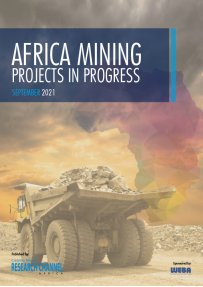NEW REPORT AVAILABLE
Africa Mining Projects in Progress 2021 (PDF Report)

Africa’s mining industry, for the most part, weathered the storm of the Covid-19 pandemic in 2020. The sector dealt with the impact of the pandemic extremely well, leading an effective response.
Most governments on the continent, acutely aware of the economic significance of mining commodities, steered clear of forcing strict restrictions on producing mining operations and their supply chains, global risk consultancy Control Risks states.
Taking into consideration the existing model of far-flung mine camps across the continent, the mining industry, generally, managed to isolate itself from the outside world through on-site lockdowns and strict access controls. At sites where a strong culture of health and safety already existed, mining companies were able to establish robust testing and isolation infrastructure, often outperforming their host governments.
However, the extent, as well as the different effects, of the pandemic on mining in Africa are still unknown.
The Covid-19 pandemic has, in some instances, made seemingly simple challenges insurmountable for some exploration and mining companies. The impacts of ongoing travel restrictions will be particularly detrimental to exploration and development activities, as well as to the investors, consultancies and engineering firms who need to physically evaluate these projects on-the-ground as part of technical studies and due diligence processes.
Stopping the exploration and development of new mines is, however, not an option, with some commentators expressing concern about the dearth of exploration investment and discovery of new deposits even before the pandemic.
At the last count there were 259 companies exploring in Africa in 2020, an increase of one over 2019.
Mining companies’ exploration budgets for Africa fell 10% to a four-year low in 2020, according to S&P Global Market Intelligence. With less exploration activity, African mineral resources might not be developed fast enough to replace older mines as they become depleted.
Spending was pulled down by lower allocations to the continent's top exploration destinations – Democratic Republic of Congo, Burkina Faso, Ghana and South Africa, which contributed to a collective $95-million cut, or 85% of the total decrease – S&P states.
While budgets for junior and major companies declined, by 7% and 17% respectively, planned exploration expenditure in Africa by intermediate companies, increased by 7%, or $13.90-million, year-over-year.
The intermediates' increase drove the majors' Africa share below 50%; however, their 48% was still more than double than that of the intermediates' 21%. The juniors had the second-biggest share of Africa budgets at 30%, despite dropping by 7%, or $21.40-million, year-on-year.
Post-pandemic economic recovery could drive higher metals demand and prices, however, potentially encouraging increased exploration spending, specifically in gold. S&P noted in November 2020 that most companies currently exploring in Africa were after gold, which had a 58% share of the regional budget.
The exploitation of gold, or any metal or mineral on the continent for that matter, will, however, strongly hinge on the speed of Covid-19 vaccination programmes, which are expected to expedite the world’s recovery from the pandemic and boost the mining sector.
Published on: 23 September 2021.






